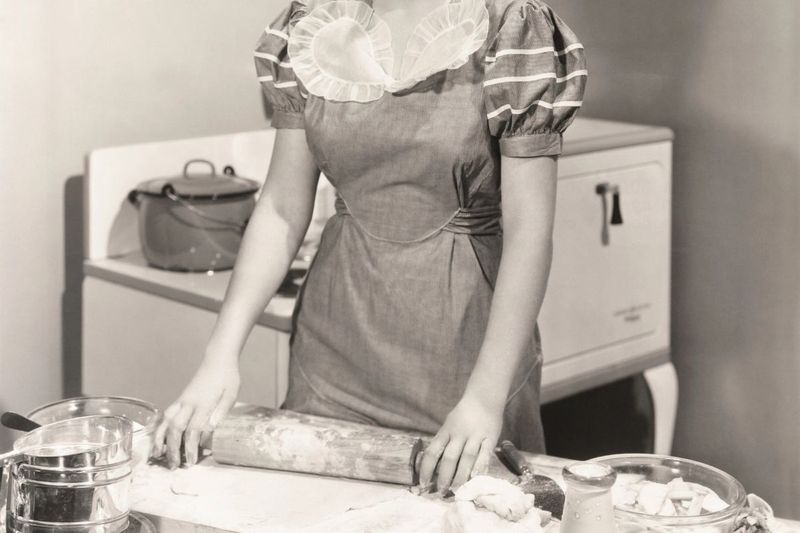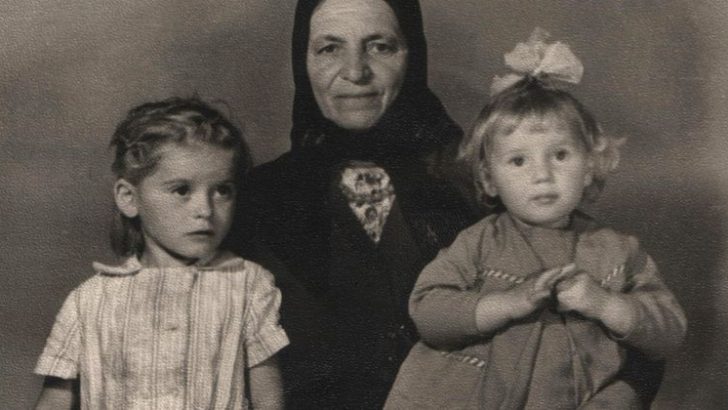The 1940s were a unique time, marked by world events and a different approach to parenting. Grandparents of this era often imparted wisdom through sayings that reflected the cultural and social norms of the time. These expressions, sometimes humorous, sometimes reflective, capture the spirit of an era when family values, hard work, and resilience were paramount. Explore these twelve memorable sayings that many grandparents lived by as they raised their children in the ’40s, and see how they offer insight into the everyday lives and values of the past.
1. “Waste not, want not”

In the 1940s, resources were scarce, and the mantra “Waste not, want not” became a household rule. Grandparents imparted this wisdom, emphasizing the importance of frugality and resourcefulness. The post-war period required families to make the most of what they had.
To avoid unnecessary spending, they reused and repurposed items, ingraining an appreciation for conservation in their children. Whether it was patching up clothes or saving leftovers, this saying was a reminder to cherish and utilize every resource available.
It taught a valuable lesson in careful management of household supplies, creating a culture of mindfulness and gratitude.
2. “Children should be seen, not heard”

The notion that “Children should be seen, not heard” was a common sentiment among grandparents in the 1940s. This saying reflected the era’s emphasis on respect and discipline, where children were expected to behave with decorum in adult settings.
Grandparents often reminded their grandchildren of their place, encouraging them to observe and learn rather than interrupt adult conversations. This approach was believed to instill patience and attentiveness in children.
While modern views may differ, this saying highlights the strict social norms and expectations that shaped interactions between generations at the time.
3. “A stitch in time saves nine”

“A stitch in time saves nine” was a common phrase that underscored the importance of addressing problems promptly. Grandparents emphasized this adage to teach the value of foresight and diligence.
By tackling small issues before they grew, families could save time and resources, a crucial practice in an era marked by limited means. This saying encouraged a proactive attitude, promoting careful maintenance of belongings.
Whether mending clothes or fixing household items, the message was clear: timely interventions prevent future troubles, a lesson in prudence that resonated through the decades.
4. “Idle hands are the devil’s workshop”

This expression warned against idleness and its potential to lead to mischief. In the 1940s, grandparents often repeated this saying to instill a work ethic and sense of responsibility in their grandchildren.
Keeping busy was seen as a virtue, a way to cultivate productive habits and moral character. Grandparents encouraged children to engage in constructive activities, from chores to crafts, filling their time with meaningful pursuits.
The phrase served as a reminder that purposeful engagement kept one on a righteous path, reinforcing the era’s belief in diligence and moral integrity.
5. “Early to bed, early to rise”

The proverb “Early to bed, early to rise” was a staple in teaching the benefits of a disciplined daily routine. Grandparents advocated this lifestyle, believing it led to health and prosperity.
In the 1940s, this advice was rooted in agricultural and rural traditions, reflecting a time when early rising aligned with the natural order of work and life. Families were encouraged to embrace this rhythm as a path to success.
This saying reinforced the values of hard work and self-discipline, principles that grandparents passed down through generations with unwavering belief.
6. “Spare the rod, spoil the child”

In a time when discipline was strictly enforced, the saying “Spare the rod, spoil the child” reflected the prevailing philosophy of upbringing. Grandparents believed in firm guidance to mold respectful and obedient children.
This approach manifested in various forms of discipline, illustrating a belief in boundaries and consequences. Though modern perspectives on discipline have evolved, this saying was a common mantra, guiding parenting techniques in the 1940s.
It highlights the era’s emphasis on authority and order, shaping generations with a strong sense of respect and responsibility towards family and community.
7. “Cleanliness is next to godliness”

The adage “Cleanliness is next to godliness” was a guiding principle for many grandparents. Emphasizing hygiene and tidiness, this saying underscored the belief that a clean environment reflected moral virtue and self-respect.
In the 1940s, maintaining cleanliness was not only about health but also about upholding family pride and societal expectations. Grandparents instilled this value in children through daily chores and personal grooming.
This expression highlighted the era’s dedication to propriety and discipline, teaching generations that cleanliness was a reflection of character and honor.
8. “You are what you eat”

The phrase “You are what you eat” encouraged mindful eating habits, a practice grandparents championed in the ’40s. Emphasizing nutrition and wholesome meals, they believed diet directly affected health and well-being.
During this time, food was often home-cooked, with an emphasis on fresh, local ingredients. Grandparents imparted the value of balanced meals, linking nutrition to vitality and longevity.
This saying reinforced the connection between sustenance and life quality, teaching children to appreciate and understand the impact of their dietary choices on their physical and mental health.
9. “A penny saved is a penny earned”

Saving money was a crucial aspect of life in the 1940s, and the saying “A penny saved is a penny earned” captured this ethos perfectly. Grandparents taught the importance of financial prudence and saving for the future.
In a time when economic stability was uncertain, this maxim served as a guide for managing finances wisely. They encouraged children to practice thrift, instilling a sense of responsibility and foresight.
It was a lesson in economic mindfulness and preparation, promoting the idea that small savings could accumulate into significant resources over time, ensuring security and peace of mind.
10. “Don’t count your chickens before they hatch”

“Don’t count your chickens before they hatch” was a metaphor for caution and patience, a lesson grandparents imparted with practical wisdom. This saying warned against making premature assumptions or celebrating victories too soon.
In the ’40s, a time of unpredictability, it was crucial to temper expectations and remain grounded. Grandparents used this phrase to teach children about the importance of planning and hope without overconfidence.
It encouraged a balance between optimism and realism, reinforcing the value of patience and the understanding that outcomes are uncertain until fully realized.
11. “There’s no place like home”

This phrase encapsulated the comfort and security found within the family home. In the 1940s, grandparents often emphasized the sanctity and warmth of the household, where love and support thrived.
Home was more than a shelter; it was a place of belonging and shared memories. Grandparents instilled this sentiment, cherishing moments spent together and nurturing familial bonds.
“There’s no place like home” was a reminder of the emotional foundation and stability that family provided, a sentiment that resonated deeply, creating a legacy of love and connection that transcended generations.
12. “Many hands make light work”

In an era when community and family cooperation were vital, the saying “Many hands make light work” highlighted the importance of teamwork. Grandparents emphasized collaboration, teaching that joint efforts eased burdens and strengthened bonds.
Tasks were shared among family and neighbors, fostering a spirit of unity and mutual support. This approach not only made chores manageable but also created a sense of accomplishment and camaraderie.
The saying reinforced the belief in collective strength, showing how working together could transform challenges into enjoyable and rewarding experiences, building resilient and connected communities.

